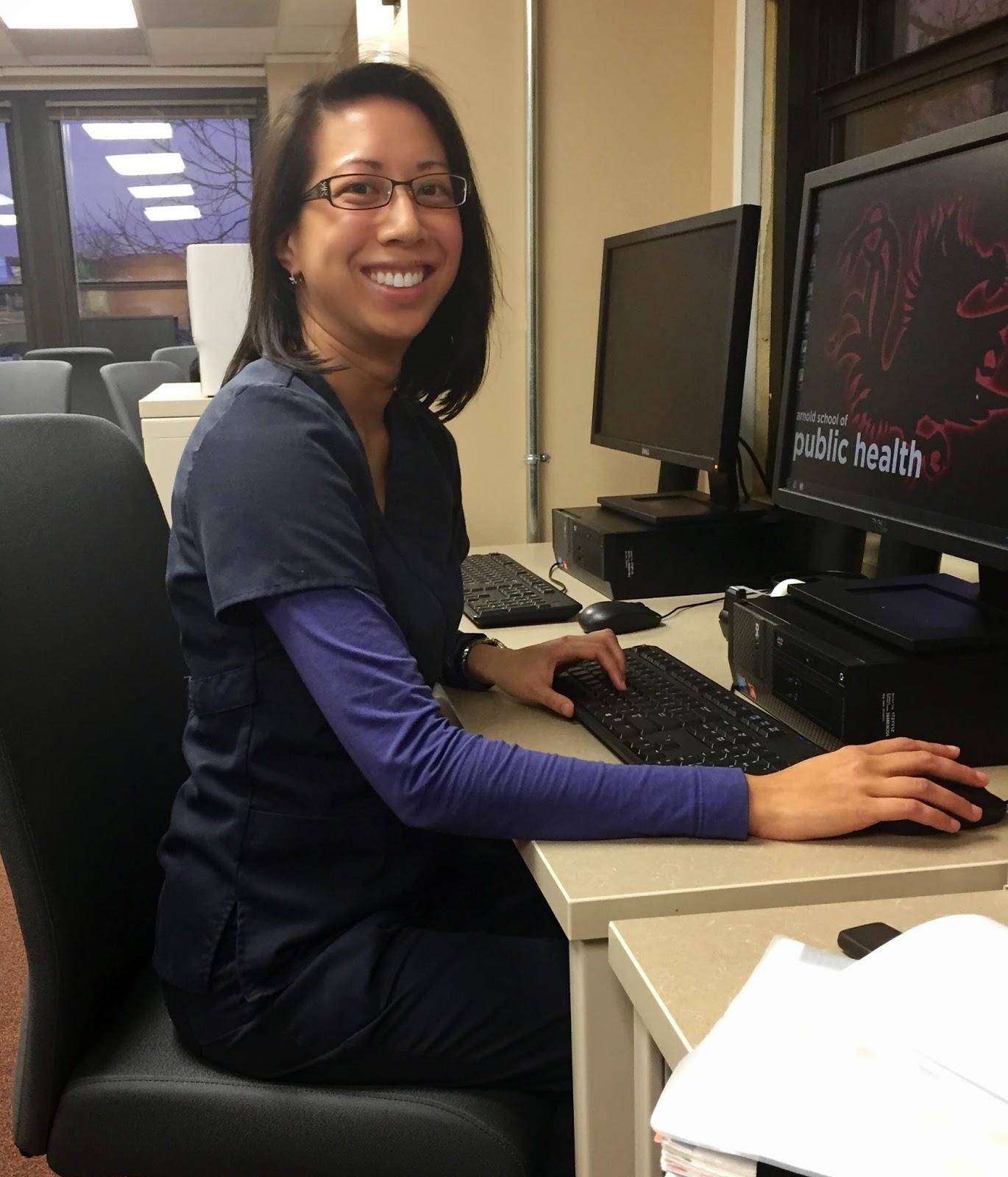Stacey Sangtian served as a
Dominican Volunteer from 2011-2012 at St. Anthony of Padua School in New
Orleans, LA, where she lived in community with the Dominican Sisters of Peace. Stacey
is currently working on a Master’s in Speech Pathology at the University of South
Carolina and expects to graduate in August 2016.
This week I headed back to school to continue studies
for my Master’s in Speech Pathology. Some weeks I wish I could go back to my DV
year (2011-2012) in New Orleans as a pre-school teacher’s assistant where the
lead teacher said my work “doesn’t have to be perfect; it just has to be better
than a 3-year-old’s.” Those were the days of being with 3-year-old
pre-schoolers by day and 70+-year-old nuns by night, an atypical, but
invaluable, experience for a fresh college graduate.
Stacey teaching students how to cut paper.
Those pre-schoolers gave me something to genuinely smile and laugh about
every single day. They found joy in the smallest things, an ability I try to
imitate in my life. I mean, when was the last time I had an ecstatic response
to getting an extra animal cracker at snack time? Over time, however, I
discovered the realities some of those children faced outside of the school
environment. That girl who loved playing on the magnet board? A different
person picked her up from school every day, a glimpse into her unstable family
life. That boy who loved running around the gymnasium? He lived in a
neighborhood where it wasn’t safe for him to play outside in his own yard. Despite
their adversities, the parents did their best to provide their children with a
good Catholic education in a safe environment by enrolling them at St. Anthony’s.
In return, it was my responsibility to foster that safe, nurturing environment
for the children to grow and learn to love school.
Stacey helping a student hold scissors.
Generally speaking, working with three-year-olds was easy. When the
children had something to say, they called out my name as their whole bodies
wriggled with eagerness to share: “Miss Stacey! So-and-so touched my paper,” or
“Miss Stacey! MISS STACEY! MISS STACEY…Today I ate a cookie.” But there was one
child in my class, whom I will call DF, whose speech was more difficult to
decipher than his peers’. DF didn’t live in the safest area of New Orleans and
came from an unstable family, but he loved school. He loved learning, taking on
challenges, and tried to choose right over wrong, which is why my heart sank
each time a frown and exasperated look of defeat showed on DF’s face at moments
when the neither the lead teacher nor I could figure out what he was saying.
One time I sent DF to the “calming square” because he knocked over
someone’s block tower…or so I thought. His limited intelligibility made it
difficult for him to defend himself, through no fault of his own. Fortunately,
one of his classmates came over and explained that it was an accident. Given
the context, I pieced together what DF had unsuccessfully tried to tell me and
realized my mistake. I apologized to DF, thanked him for trying to tell me the
truth, and he went back to playing – no hard feelings, no grudges, just a smile
of satisfaction knowing that he was understood.
It was my experiences with DF that first inspired me to explore the
field of speech pathology. It is easy for children (and adults) like DF to get
brushed aside because they struggle with clearly articulating their needs;
consequently, their needs are not met. Think about how frustrating it would be
to have the words in your head but be unable to get them out. How does that
impact your home life? Your social life? Your life at school? What about
answering the phone, or ordering at a restaurant?
The children I served at St. Anthony’s faced a variety of challenging
circumstances. Some of the challenges require systemic change for a meaningful
effect to take place. Some challenges can be overcome through hard work by the
individual. It is easy to get overwhelmed thinking about the levels of
challenges people face in the world and figuring out where you fit in the midst
of it all.
My experiences as a DV, through my ministry and through witnessing the
great work done by the Sisters in a variety of areas, have taught me that there
is always room to be part of the solution. I may not be able to fix everything,
but I can fix something. At closing retreat, my fellow DV Margaret Knows The
Ground (2011-2013) gave a piece of advice that worked as a spring board as I
pondered how I would combine my call to service with choosing a job: “View your
career as a ministry.” It didn’t happen right away, but I realized that speech
pathology would be my career and my ministry.
Stacey beginning a day of school work.
As a speech pathologist, I am able to minister to others by helping them
get their voices heard, whether it be through their actual voice or an
alternative means of communication. Furthermore, as swallowing falls under the
speech pathologist’s scope of practice, I am also able to help people gain the
ability to enjoy eating that extra animal cracker at snack time!
As for DF, during my DV year he was ineligible for speech services
provided by the state due to his young age. His family could not afford private
services. Even though I no longer interact with DF in person, I am reminded of
him in the patients I treat and do my best to provide these patients with the
same care I would have wanted DF to receive.
You can learn more about identifying signs
of communication disorders at identifythesigns.org




No comments:
Post a Comment